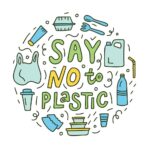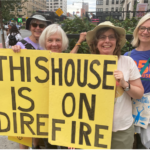 Kermit says … learn about all the damage plastics can do!
Kermit says … learn about all the damage plastics can do!
Third Installment of Three-Part Plastics Article for Kermit’s Corner
Plastic pollution is everywhere and the problem is worsening significantly every year. Only 5% of plastics are recycled each year and 72% wind up in landfills or in the environment. The extent of the problem has been described as 1 garbage truck full of plastic being dumped in the ocean every minute. As these plastics degrade into microplastics, they spread through natural environmental systems into our earth, air, water, food and ourselves. As biblically mandated stewards of the earth, we are called to take action immediately to remedy this crisis. We can call upon governments to legislate significant reductions in plastic production and usage. After decades of soaring profits, all related industries must be made to bear the cost of the damage plastics have done to our earth and its vastly interconnected, vital, natural systems. Better, more effective recycling programs and systems must be created and economically supported especially in underserved rural areas. Factories which produce plastics must be better regulated to end the significant pollution of nearby areas which sicken the residents and workers.
Big oil industries which create the plastics must also help to fund these programs, as well as programs designed to facilitate the transition from single use plastic products to reusable glass and metal containers. For a circular economy of reusing refillable containers to succeed, we consumers need to be open to, and committed to, making these changes in our own lives for our own health and the health of the planet. We voters can take action by repeatedly contacting our representatives over time to voice our support for these efforts. We can take part in activities promoted by reputable environmental organizations such as 350.org. Also, we can share our concerns by submitting letters to newspapers and websites. We can share information on social media and create blogs, video blogs and podcasts. Joining community groups dedicated to environmental causes can provide a framework of events and group support to focus our efforts and facilitate changing our old habits. Don’t be overwhelmed. Don’t despair. Just do something.
For more information on the extent of the plastics problem and potential solutions go to:
https://www.technologyreview.com/2023/10/12/1081129/plastic-recycling-climate-change-microplastics/. Also, see: https://nap.nationalacademies.org/catalog/26132/reckoning-with-the-us-role-in-global-ocean-plastic-waste
From the Green Team
By Ronda Yeomans
 World Clean-Up Day
World Clean-Up Day
Joe Hudock, Laura Beck and Ronda Yeomans participated in World Clean Up Day on September 16. They started at Edwards and picked up trash along Elm Street, Central Street, Water Street and the Pinefield Shopping Plaza Parking Lot.

March to End Fossil Fuels
On a beautiful, sunny mid-September Sunday, Mary Memmott and I traveled to New York and back on a bus chartered by 350 Mass. In NYC the bus let us off at 57th and Broadway in plenty of time for the 1:00 p.m. start of the March to End Fossil Fuels.
As we were waiting, some of us got to chat with Bill McKibben, the environmental writer and activist who founded 350.org 15 years ago. His 1989 book “The End of Nature” was the first introduction to the question of climate change for many readers. Jim Antal, the former Conference Minister and President of the Massachusetts UCC, was the one who introduced me (Jenny) to 350.org., now an international organization. The name refers to 350 parts per million of carbon in the atmosphere, deemed a “safe” level. We are currently at 421 and rising sharply. Those of us who started Transition Framingham were encouraged by Jim who arranged for us to hold our initial training session at the Conference Center back in 2012.
At the march, we could also see a gorgeous large whale puppet, and a turtle, held aloft by a sea of activists dressed in blue and green, with a large blue tarp representing the ocean, and shoals of fish, which were flattened dirty plastic bottles on sticks held by the folk in sea colors that “swam” around and under the tarp. There was Reverend Billy (in a white suit and dog collar) and the Stop Shopping Choir, a radical performance community that preaches the message of a life beyond consumerism. Google them!
In front of us was Sabine von Mering, Brandeis professor and 350Mass activist, dressed as a polar bear with a sign saying “Help!”. Behind her were 20 or so Brandeis students holding a very long banner that stretched across the width of a city block, with stripes representing the steady warming of the Earth’s atmosphere since the beginning of the industrial age. There were musicians and chants, such as “Hey Hey, Ho Ho, Fossil Fuels have got to go”, and “What do we want? Climate Justice! When do we want it? Now!” There were indigenous peoples’ groups, faith groups, Louisiana front line community groups, young and old. A very diverse crowd.
Among the speakers at the rally near the United Nations at the end of the March was New York Representative Alexandria Ocasio-Cortez, who, along with Massachusetts Senator Ed Markey, pioneered the idea of a Green New Deal in 2019.
On our return trip, Larry circulated a petition asking Governor Healey to say no to a proposed tripling of hangar and runway space for private jets at Hanscom Air Force Base in Concord. Private jet travel is much, much worse for the environment than commercial aviation, putting at least 10 times as much carbon dioxide into the atmosphere. You can sign the petition online here, or sign up for updates from 350 Mass here. Even if you aren’t up for a road trip or marching in the streets, there are so many ways you can use your voice to speak out about climate. There were 75,000 of us marching in New York. If each of us reaches out to our circle of friends to take action on climate (that’s you!) imagine the impact we could have.
Jenny Allen and Mary Memmott